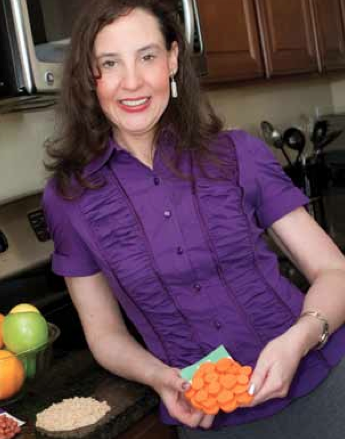Nutritionist Debbie Polisky looks at the world, especially the world of food, with multicultural eyes.
Born and educated in Buenos Aires, Latin American foods and language are part of her nature. Her mother’s parents left Hungary before World War II and moved to New York, while her father’s parents escaped the war in Russia/Poland and landed in Argentina – so it’s no surprise she experienced European and American cuisine growing up.
After earning a bachelor’s degree in nutrition from the University of Buenos Aires, she worked as a clinical dietician for seven years before she was hired as a bilingual nutritionist. She and her husband, Alejandro Rabinovitz, moved to Arizona in 2000 for her new job. Despite her multicultural upbringing, she had one shock when she arrived: “Super-sizing seemed to be the norm.”
Debbie says portion control is a very important component of nutrition. She says her Jewish patients battle not only the American tendency to super-size, but also the dominant role of food in virtually every Jewish celebration, the prevalence of high-fat foods such as chopped liver and latkes, and the stereotypical tendency of Jewish mothers to tell their children (even long into adulthood) to eat everything on their plate.
Yet Judaism also has many positive messages about food, including perhaps the world’s first advice on portion control. Medieval physician and philosopher Maimonides (1135-1204) offered numerous rules for healthy eating in his 14-volume opus on Jewish law, the Mishneh Torah. “He would say eat only until one’s stomach is three-quarters full – meaning portion control,” says Debbie. “We shouldn’t stuff ourselves; that was good philosophy of his.”
“One aspect of kosher that promotes healthy eating is don’t combine meat and dairy,” says Debbie. “Both have high fat contents, so if you don’t combine, you may have less fat per meal.”
While Ashkenazi diets feature many foods high in fat and sodium, the high intake of fish such as herring and salmon provides heart-healthy omega 3 fats, while rye and pumpernickel bread are higher in fiber than many breads. Sephardic culture offers healthier Mediterranean and Middle Eastern foods such as couscous and lentils.
In recent decades, Debbie says many kosher cookbooks have modified traditional Ashkenazi recipes to provide traditional flavors with lower fat and sodium levels.
After 11 years working as a bilingual community nutritionist in a community health center, she decided to open her own business, Words & Health (wordsandhealth.com). In her first two years in private practice, she has garnered numerous awards for her work serving minorities and as a health educator. She won the 2012 NBC/Telemundo Hispanic Business Salute Award and the Latin Perspectives 2012 Entrepreneur Award. In 2013, she was honored as one of 40 alumni of Keller Graduate School (where she earned an MBA) for starting a successful business reaching more than 20,000 minorities.
While most of her work has been with the Hispanic community, Debbie says she would like to expand her outreach to the Jewish community. Last year she taught cooking classes and workshops on how to eat healthy on a limited income for Jewish Family and Children’s Services in Phoenix.






